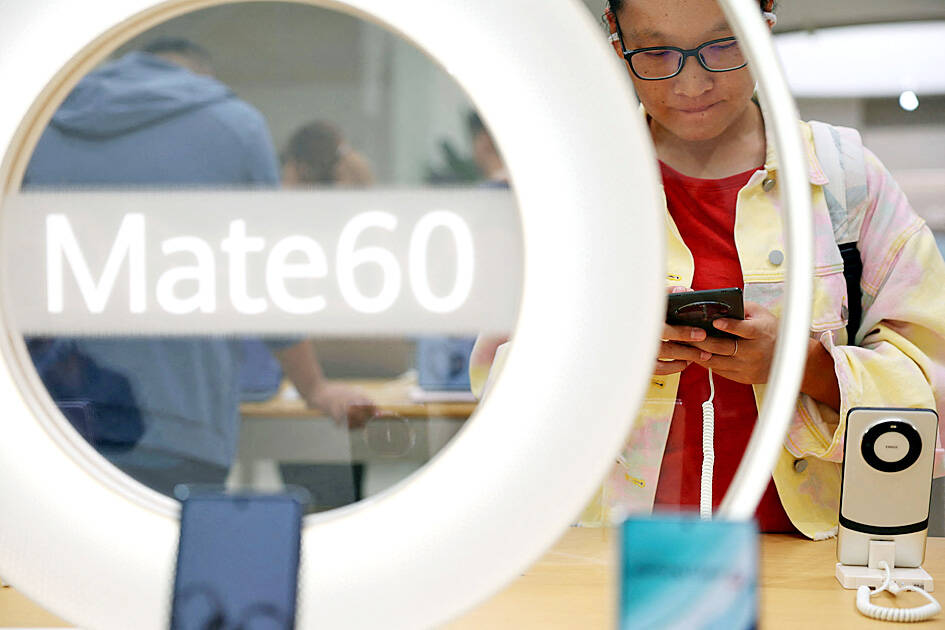Huawei Technologies Co (華為) largely omitted mention of its controversial Mate 60 smartphone series at a grand showcase of its new consumer products yesterday.
The Shenzhen-based company would increase smartphone production in response to demand, said consumer division chief Richard Yu (余承東), without naming the handset triggering that surge.
The Mate 60 Pro earned international notoriety with its advanced made-in-China processor last month, causing concern in Washington about Huawei’s progress toward developing in-house chipmaking capabilities despite US trade curbs.

Photo: Reuters
Huawei’s new phones have fired up the company’s sales and were among the top sellers in China in the week before Apple Inc’s latest iPhone launch. They are the first 5G-capable handsets that Huawei has put on sale since the administration of former US president Donald Trump’s sanctions cut it off from advanced tech suppliers. That connectivity is provided by the 7-nanometer Kirin 9000s processor inside — made by Shanghai-based Semiconductor Manufacturing International Corp (中芯) — which is accompanied by a broad range of China-made components inside each phone.
In another step toward self-reliance, Huawei did away with its longstanding partnership with Porsche Design, appointing instead Hong Kong celebrity Andy Lau (劉德華) as a brand ambassador to promote what it now calls Ultimate Design models.
Huawei provided a seconds-long glimpse of such a limited-edition variant of its Mate 60, and showed off its flagship MatePad tablet and new smartwatches.
Yu spent much of his time on stage benchmarking the MatePad Pro against Apple’s iPad Pro, underscoring Huawei’s aspiration to measure itself against the world’s best.
The Chinese company also touted its own semiconductor design used in a new set of wireless earbuds, though it did not provide details on the chip.
Meanwhile, Apple’s basic iPhone 15 model is taking almost twice as long for deliveries this year than its predecessor, signaling high demand for the company’s latest handsets.
US buyers need to wait for 10 days to receive the basic model, up from six days for the previous generation device launched last year, Counterpoint Research data showed.
At the other end of the spectrum, Apple’s top-tier iPhone 15 Pro Max increased pre-order waiting times to a record, researchers found.
In China, Apple’s largest overseas market, wait times for the basic version quadrupled from last year, Counterpoint said.
That suggests Apple is attracting buyers even amid competition from rival devices such as Huawei’s highly touted Mate 60 Pro.

Intel Corp chief executive officer Lip-Bu Tan (陳立武) is expected to meet with Taiwanese suppliers next month in conjunction with the opening of the Computex Taipei trade show, supply chain sources said on Monday. The visit, the first for Tan to Taiwan since assuming his new post last month, would be aimed at enhancing Intel’s ties with suppliers in Taiwan as he attempts to help turn around the struggling US chipmaker, the sources said. Tan is to hold a banquet to celebrate Intel’s 40-year presence in Taiwan before Computex opens on May 20 and invite dozens of Taiwanese suppliers to exchange views

Application-specific integrated circuit designer Faraday Technology Corp (智原) yesterday said that although revenue this quarter would decline 30 percent from last quarter, it retained its full-year forecast of revenue growth of 100 percent. The company attributed the quarterly drop to a slowdown in customers’ production of chips using Faraday’s advanced packaging technology. The company is still confident about its revenue growth this year, given its strong “design-win” — or the projects it won to help customers design their chips, Faraday president Steve Wang (王國雍) told an online earnings conference. “The design-win this year is better than we expected. We believe we will win

Chizuko Kimura has become the first female sushi chef in the world to win a Michelin star, fulfilling a promise she made to her dying husband to continue his legacy. The 54-year-old Japanese chef regained the Michelin star her late husband, Shunei Kimura, won three years ago for their Sushi Shunei restaurant in Paris. For Shunei Kimura, the star was a dream come true. However, the joy was short-lived. He died from cancer just three months later in June 2022. He was 65. The following year, the restaurant in the heart of Montmartre lost its star rating. Chizuko Kimura insisted that the new star is still down

While China’s leaders use their economic and political might to fight US President Donald Trump’s trade war “to the end,” its army of social media soldiers are embarking on a more humorous campaign online. Trump’s tariff blitz has seen Washington and Beijing impose eye-watering duties on imports from the other, fanning a standoff between the economic superpowers that has sparked global recession fears and sent markets into a tailspin. Trump says his policy is a response to years of being “ripped off” by other countries and aims to bring manufacturing to the US, forcing companies to employ US workers. However, China’s online warriors